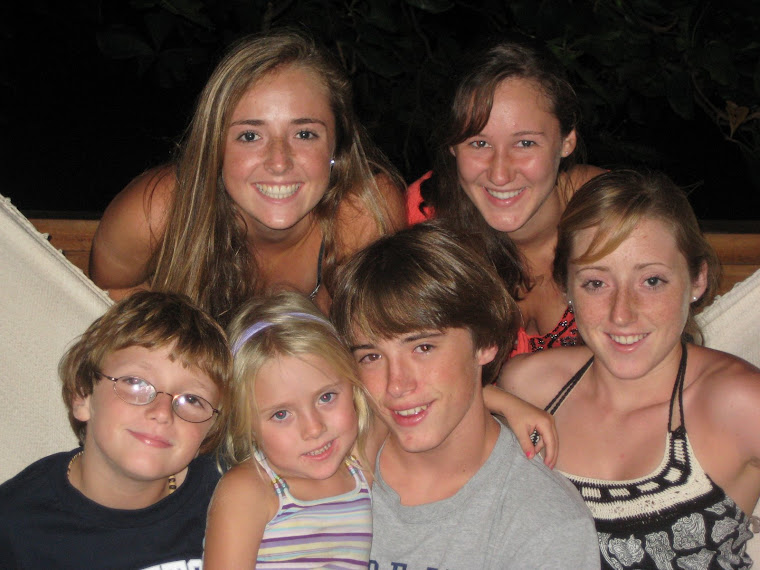I am teaching 16 first and second graders which is why I am not blogging very often and why, in all likelihood, you will probably be hearing a lot of classroom anecdotes if you hear from me at all in the next months. Last week was our big Thanksgiving program at school followed by our Feast, even tho the Costa Ricans are not big fans of the pilgrims, or pil-GRAMS, as Alexa calls them with emphasis. But being an American school we pulled out all the stops and I ate three turkey dinners before the week was over. I love turkey and I am, after all, a living example of what the pilgrims were to become, twelve generations after they hit the rock. So I can never get enough turkey and can whip up a pilgrim hat with little prelude.
For the occasion and to honor my forefathers, my amiga and I wrote an original Thanksgiving play called, with great imagination, "Thanksgiving Play." I wanted to write "Thanksgiving, the musical," but Bono was busy on Broadway working on Spiderman. So we settled for something with less of a score. Like every other first and second grade classroom in America, and one or two beyond its pilgrim-loving borders, we enacted the whole story starting in England with the King as villain disallowing his subjects to pray as they please, then moving on to Holland where the children became naughty because, after all, this was the home of Amsterdam so what were they thinking anyway and they were praying freely but in Dutch, what?! In an act of linguistic desperation, the pilgrims hired the Mayflower and the ill-fated Speedwell which you may, or may not recall (I had forgotten it myself) which proved to be holier than thou and began sinking soon after they set sail.
The pilgrims limped back to Holland where their kids once again had to translate every blooming conversation their parents attempted which, incidentally, is something my own kids can relate to in our current cross-cultural living situation. When they had successfully crammed all 100 pilgrims onto the Mayflower they set sail for America again, take two. When given a replica of the Mayflower to color in class, many of my students chose to decorate the sails with brightly colored flowers - get it? - in a much-improved version of the dingy white ones which were impossible to clean and with which those plain folks grew quickly bored and which might have cheered them up on their two month voyage had they simply admitted that plain and boring was not necessarily the only pathway to heaven. There being no floating hospitals in the midst of the Atlantic, at least not in 1620, Oceanus was born at sea and he was a boy but in a brilliant stroke of artistic license coupled by a shortage of boys in our class, we cast he as a she.
Finally the pilgrims hit the rock, which is yet another brilliant stroke of artistic license by the history makers, as you surely know if you have ever been to Plymouth to see the famed Rock which sits in a cage and typically results in exclamations of disbelief and a vast sense of being both underwhelmed and somehow misled by both history books and first grade teachers everywhere even though you find yourself squinting at said stone as you are simultaneously blinded by the flash photography of busloads of Asian tourists who seem quite happy with this scheduled stop at the rock on their tour even tho the rock is really more like a pebble. But maybe the Japanese are used to things being a little smaller than previously imagined. Meanwhile, back at our story, the pilgrims hit the promised land where they see not only that they will be free to pray as they please but that they had better get started because it was November in New England and, as Rumor (brilliantly played by Bella) notes immediately, "There are no flowers here!" Which, in our play, is succeeded by similar sentimental expressions of surprise and dismay culminating in Rumor lamenting, "Who will help us?"
This is where Squanto appears to save the day by showing them how to use the very first organic fish fertilizer to plant their corn and pease (simple living somehow included adding an extra -e to every word), all of which leads to the following year when the stalwart survivors decide to forego hiring prestigious party planners from the island of Mannahatta and opt to plan their own simple and organic, yet humble, first Thanksgiving feast. In reading this part of the story in class, Camillo - a native Costa Rican who would ultimately go on to play Chief Massasoit - was supposed to say, 'I will bring my chief." Instead, with a slip of the tongue coupled by an inability to read, which is probably how most of history has evolved, Camillo said, "I will bring my chef." Which was probably a better idea anyway.
Happy Belated Thanksgiving,
K3
Subscribe to:
Post Comments (Atom)






No comments:
Post a Comment